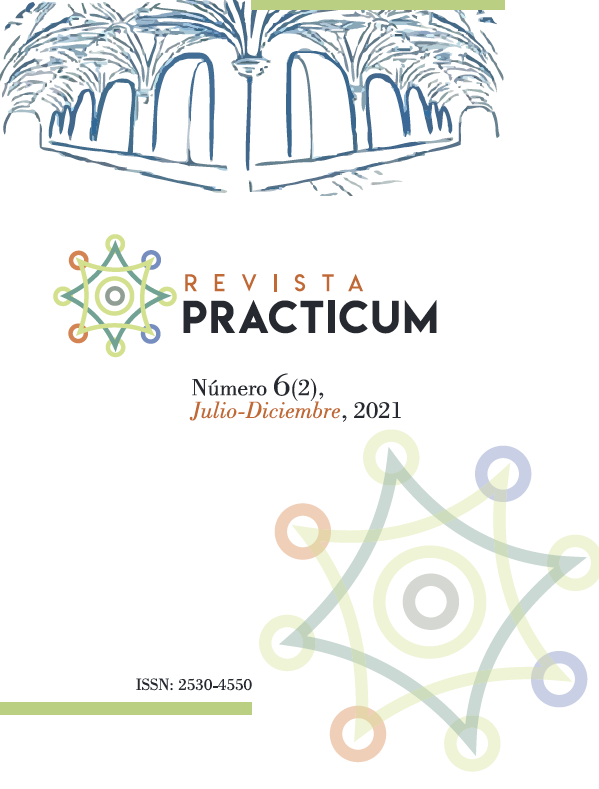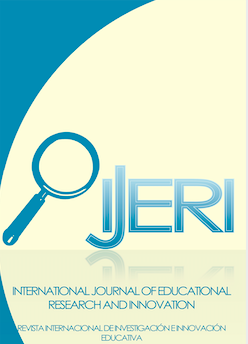Peer mentoring using the David Allen targeting protocol
DOI:
https://doi.org/10.24310/RevPracticumrep.v6i2.11958Keywords:
Peer tutoring, methodologies, tuning protocol, teacher training, portfolio, feedbackAbstract
Collaborative work is a competency that is currently in demand in all professions. The present work aims to highlight the functions of the tutoring team for the reflection of the tutoring team for the reflection of the teaching practice using the Targeting Protocol as a resource. This study has a qualitative approach of descriptive scope. The content analysis method was used, taking as a research resource the portfolios developed by the students three tutoring teams from the last three generations of the master’s degree in Preschool Education from the Benemérita and Centenaria State Normal School (BECENE). The results show that the tutoring team served as a cognitive and emotional scaffold within the process of building pedagogical knowledge. The peer tutoring experiences through the Targeting Protocol coincide in their transformative potential in the master´s training process. Finally some suggestions are presented to improve the process.
Downloads
Metrics
Publication Facts
Reviewer profiles N/A
Author statements
Indexed in
-
—
- Academic society
- N/A
- Publisher
- Universidad de Málaga
References
Allen, D. (2007). La evaluación del aprendizaje de los estudiantes. Una herramienta para el desarrollo profesional de los docentes. Paidós.
lsina, A. (2009). El aprendizaje realista: una contribución de la investigación. En M.J. González, M.T. González y J. Murillo (Eds.), Investigación en Educación Matemática XIII, (pp. 119- 127). SEIEM.
ABardin, L. (2013). L’analyse de contenu. PUF.
Bisquerra, R. (2008). Educación para la ciudadanía y la convivencia. El enfoque de la educación emocional. Wolters Kluwer.
Blanch, S., Duran, D., Valdebenito, V. y Flores, M. (2013). The Effects and Characteristics of Family Involvement on a Peer Tutoring Programme to Improve the Reading Comprehension Competence. European Journal of Psychology of Education, 28 (1), 101-119. https://doi.org/10.1016/j.sbspro.2012.05.361
Calvo, G. (2014). Desarrollo profesional docente. El aprendizaje profesional colaborativo. En CEPPE, Temas críticos para formular nuevas políticas docentes en América Latina y el Caribe: el debate actual (112- 152). OREALC/UNESCO. https://bit.ly/2YKNbl6
Colomo, E. y Gabarda, V. (2019). ¿Qué tipo de Docentes Tutorizan las Prácticas de los Futuros Maestros de Primaria? REICE. Revista Iberoamericana sobre Calidad, Eficacia y Cambio en Educación, 17(3), 59-78. https://doi.org/10.15366/reice2019.17.3.004
Del Valle, M. y Castro, M.C. (2015). Interdisciplinariedad, investigación-acción y trabajo colaborativo en el aprendizaje del inglés técnico. Multiciencias, 15 (2), 210-218 https://bit.ly/2t73j17
Durán, D., Flores, M. y Valdebenito, V. (2015). Tutoría entre iguales. Concepto y práctica como metodología para la educación inclusiva. Revista Latinoamericana, 9(2), 23-40. https://bit.ly/2TocB3p
Escudero-Muñoz, J.M. (2009). Comunidades docentes de aprendizaje, formación del profesorado y mejora de la Educación. Ágora para la Educación Física y el Deporte, 10, 7-31. https://bit.ly/2uPye2o
García-Carpintero, E. (2017). El portafolio como metodología de enseñanza aprendizaje y evaluación en el practicum: percepciones de los estudiantes. Revista de docencia universitaria, 15(1), 241-257.
Gutiérrez, P. y Castro, M.P. (2018). El aprendizaje entre iguales como metodología de trabajo para la inclusión educativa. Experiencia docente en la escuela de Extremadura. Revista de Investigación en Educación, 16(1), 78-92 https://bit.ly/30kKeVe
Hattie, J. (2017). Aprendizaje visible para profesores. Maximizando el impacto en el aprendizaje. Ediciones Paraninfo, S.A.
Khortagen, F. (2010). La práctica, la teoría y la persona en la formación del profesorado. Revista Interuniversitaria de Formación del Profesorado, 24(2), 83-101. https://bit.ly/2QTlnEP
Monereo, C. (2010). La formación del profesorado, una pauta para el análisis e intervención a través de incidentes críticos. Revista Iberoamericana de Educación, 52, 149-178. https://doi.org/10.35362/rie520615
Morrás, A., Sancho, C. y Duran, C. (2009). El uso formativo del Portafolio Docente en el ámbito Universitario. Revista Panamericana de Pedagogía: Saberes y Quehaceres del pedagogo, (14), 57-87 https://bit.ly/2Rh54AD
Navarro, E. (coord.) (2017). Fundamentos de la investigación y la innovación educativa. Universidad Internacional de la Rioja.
Paulsen, T., Clark, T. y Anderson, R. (2016). Using the Tuning Protocol to Generate Peer Feedback During Student Teaching Lesson Plan Development. Journal of Agricultural Education, 57(3), 18-32. http://doi.org/10.5032/jae.2016.03018
Peñalva, A., y Leiva, J. (2019). Metodologías cooperativas y colaborativas en la formación del profesorado para la interculturalidad. Tendencias Pedagógicas, 33, 37-46. http://dx.doi.org/10.15366/tp2019.33.003
Ramírez, M.S. y De la Herrán, A. (2012). La Madurez Personal en el Desarrollo Profesional del Docente. REICE, 10 (3), 25-44. https://bit.ly/3aayQ2N
Sánchez, M.L. (2014). La tutoría entre iguales como estrategia educativa para desarrollar competencias. Revista Electrónica de Psicología Iztacala. 17(1), 45-57. https://bit.ly/3adnVVQ
Silva, J. y Maturana, D. (2017). Una propuesta de modelo para introducir metodologías activas en educación superior. Revista Innovación Educativa 17 (73), 117-131. https://bit.ly/2tk2zFJ
Stenhouse, L. (1993). La investigación como base de la enseñanza. Ediciones Morata.
Tejada, J., Carvalho, M.L. y Ruiz, C. (2017). El prácticum en la formación de maestros: percepciones de los protagonistas. Magis, Revista Internacional de Investigación en Educación, 9 (19), 91-114. http://doi.org/10.11144/Javeriana.m9-19.pfmp.
Varela, M y Pellicer, C. (2019). Acompañar la docencia en la escuela: retos y respuestas. En J. Manso y J. Moya Profesión y profesionalidad docente, 121-136. ANELE - REDE.
Vaillant, V. (2016). Trabajo colaborativo y nuevos escenarios para el desarrollo profesional docente. Revista Docencia, 21(60), 5-13.
Vaillant, D. y Manso, J. (2019). Orientaciones para la formación docente y el trabajo en el aula. Aprendizaje colaborativo. SUMMA y Fundación La Caixa. https://bit.ly/35QJN63.
Villagra, C. y Valdebenito, V. (2019). Tutoría entre iguales como estrategia para la formación del profesorado. Magis, Revista Internacional de Investigación en Educación, 12 (24), 161-176. https://doi.org/10.11144/Javeriana.m12-24.tief
Downloads
Published
How to Cite
Issue
Section
License
Acceptance of the work implies that the author grants Revista Prácticum the exclusive rights to reproduce, distribute and sell his or her work worldwide, both in digital and paper formats, CD-ROM, etc.
Likewise, the authors shall grant Revista Prácticum the rights of dissemination, public communication on the Internet and IT networks, data buses, as well as any other portals or electronic devices for online consultation of its contents and extracts, under the conditions of the portal, repositories or databases where the work is stored.
Revista Prácticum allows authors to publish and disseminate their articles and works on their personal websites, research teams, institutional repositories and scientific databases. All this in accordance with the Creative Commons 4.0 License










8.png)








